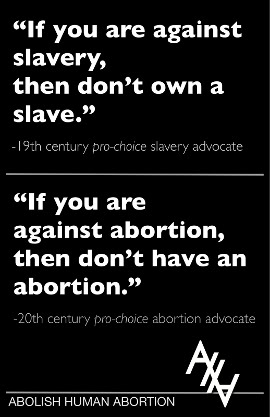The Virginia Christian Alliance recommends to our readers to visit “Abortion Facts“, which lists 20 facts on abortion. We have published Abortion Fact #8 exerpt and the link to full informative article below. If you know just a few of these facts, you will handily defeat any pro-choice advocate in any balanced debate format, hands down.
If abortion doesn’t kill children, why would someone be opposed to it? If it does kill children, why would someone defend another’s right to do it? Being personally against abortion but favoring another’s right to abortion is self-contradictory and morally baffling.
To be pro-choice about abortion is to be pro-abortion.
Suppose drug-dealing were legalized, as some have advocated. Then suppose you heard someone argue this way for selling cocaine:
I’m personally not in favor of drug dealing, but this is a matter for a drug dealer to decide between himself and his attorney. Lots of religious people are against drug dealing, but they have no right to force the anticocaine morality on others. We don’t want to go back to the days when drug dealing was done in back alleys and people died from poorly mixed cocaine, and when only rich people could get drugs and poor people couldn’t. It’s better now that qualified drug dealers can safely give cocaine to our children. I personally wouldn’t buy drugs, so I’m not pro-drugs, you understand, I’m just pro-choice about drug dealing.
 In terms of moral impact, there is no significant difference between people who are in favor of drug dealing and people who don’t like it personally but believe it should be legal. Someone who is prochoice about rape might argue that this is not the same as being prorape. But what is the real difference? Wouldn’t being pro-choice about rape allow and effectively promote the legitimacy of rape?
In terms of moral impact, there is no significant difference between people who are in favor of drug dealing and people who don’t like it personally but believe it should be legal. Someone who is prochoice about rape might argue that this is not the same as being prorape. But what is the real difference? Wouldn’t being pro-choice about rape allow and effectively promote the legitimacy of rape?
Those who were pro-choice about slavery fancied that their moral position was sound if they didn’t own slaves. Yet it was not just the pro-siavery position, but the pro-choice about slavery position, that resulted in the exploitation, beatings, and deaths of innocent people in this country. Similarly, most people in Germany did not favor the killing of Jews, but they did nothing to stop that killing.
In ancient Rome it was legal for fathers to kill their newborn children by setting them out to die of exposure or to be eaten by wild beasts. While many people would not do this to their own children, they recognized the rights of others to do so. The early Christians saw this “right” as a wrong, and when they found such children, they took them into their homes to care for them.
Some people have the illusion that being personally opposed to abortion while believing others should be free to choose it is some kind of compromise between the pro-abortion and pro-life positions. It isn’t.
Pro-choice people vote the same as pro-abortion people. Both oppose legal protection for the innocent unborn. Both are willing for children to die by abortion and must take responsibility for the killing of those babies even if they do not participate directly. To the baby who dies it makes no difference whether those who refused to protect her were pro-abortion or merely pro-choice.
The only good reason for being personally against abortion is a reason that demands we be against other people choosing to have abortions.
If abortion doesn’t kill children, why would someone be opposed to it? If it does kill children, why would someone defend another’s right to do it? Being personally against abortion but favoring another’s right to abortion is self-contradictory and morally baffling.
It’s exactly like saying:
I’m personally against child abuse, but I defend my neighbor’s right to abuse his child if that is his choice.
Or saying something like:
I’m personally against genocide, but if others want to kill off an entire race, that’s none of my business.
I’ve often heard people say, “Don’t call me pro-abortion. I’m not pro-abortion; I’m pro-choice.” My response to this statement is always the same: “Why are you opposed to being called pro-abortion? Is there something wrong with abortion?”
The “I personally oppose abortion, but… “ position is popular among politicians who want to make pro-lifers like them because they don’t feel good about abortion and pro-choicers like them because they won’t do anything to restrict abortion. My point is not simply that this position is cowardly, though certainly it is. My point is that it is utterly illogical.
The only good reason for feeling bad about abortion is that it kills an innocent child. If it doesn’t, there’s no need to feel bad. But if it does, then you should not just refrain from it yourself, you should oppose others doing it also. You should favor laws to restrict it, for exactly the same reason you favor laws to restrict rape, child molesting, and murder.
What is legal is not always right.
 One of the weakest arguments for the legitimacy of abortion is that it is legal. Civil law does not determine morality. Rather, the law should reflect a morality that exists independently of the law. Can anyone seriously believe that abortion was immoral on January 21, 1973, and moral on January 23, 1973?
One of the weakest arguments for the legitimacy of abortion is that it is legal. Civil law does not determine morality. Rather, the law should reflect a morality that exists independently of the law. Can anyone seriously believe that abortion was immoral on January 21, 1973, and moral on January 23, 1973?
If abortion killed children before the law changed, it continues to kill children since the law changed. Law or no law, either abortion has always been right and always will be, or it has always been wrong and always will be.
For hundreds of years, slaveowners argued that the slaves were theirs and that they had the right to do with them as they wished. They claimed that their personal rights and freedom of choice were at stake. They said slaves were not fully persons. They said they would experience economic hardship if they were not allowed to have slaves, and they developed slogans to gain sympathy for their cause. They maintained that others could choose not to have slaves, but that they had no right to impose their anti-slavery morality on them. Above all, they argued, slavery was perfectly legal, so no one had the right to oppose it.
This point of view was given farther legal support in the Dred Scott decision of 1857. The Supreme Court determined in a seven-to-two decision that slaves were not legal persons and were therefore not protected under the Constitution. In 1973, the Supreme Court, by another seven-to-two decision, determined that unborn children also were not legal persons and therefore not protected under the Constitution. In 1857 the chief justice of the Supreme Court said: [1]
A black man has no right which the white man is bound to respect.
Despite slavery’s legality, Abraham Lincoln challenged its morality and said this: [2]
If slavery is not wrong, then nothing is wrong.
In the 1940’s a German doctor could legally kill Jews, while in America he would have been prosecuted for murder. In the 1970’s an American doctor could legally kill unborn babies, while in Germany he would have been prosecuted for murder. Laws change. Truth and justice don’t.
How can we tell people that they are perfectly free to believe abortion is the killing of children but that they are not free to act as if what they believe is really true?
If you believed that a class of persons were being murdered by methods that included dismemberment, suffocation, and burning, resulting in excruciating pain in many cases, wouldn’t you be perplexed if someone tried to ease your outrage by telling you that you didn’t have to participate in the murders if you didn’t want to?
That’s exactly what pro-lifers hear when abortion-rights supporters tell them, “Don’t like abortion, don’t have one” or “I’m pro-choice, but personally opposed.” In the mind of the pro-lifer, this is like telling an abolitionist, “Don’t like slavery, don’t own a slave,” or telling Dietrich Bonhoeffer, “Don’t like the Holocaust, don’t kill a Jew.”
Consequently, to request that pro-lifers “shouldn’t force their pro-life belief on others,” while claiming that “they have a right to believe what they want to believe,” is to reveal an incredible ignorance of their position. [3]
SOURCE: ABORTION FACTS, READ THEM ALL!
